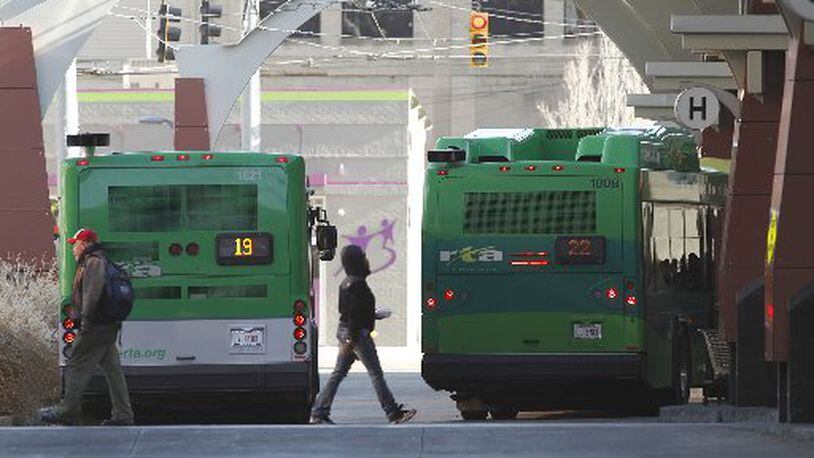“I think it’s disappointing,” said Dayton Mayor Nan Whaley. “I’m hopeful that both sides will see to it to not hold the community hostage again on this issue.”
NEW: Greater Dayton RTA drivers union files intent to strike notice
IN-DEPTH: Riders struggled during RTA strike
Riders and others who depend on RTA have reason to be concerned: The lingering contract issues have been building for years. So too have the icy relations between RTA CEO Mark Donaghy and ATU President Glenn Salyer, who represents the system’s drivers and mechanics.
Lengthy chains of emails obtained by the Dayton Daily News reveal the negotiating style ahead of the last strike, when Salyer and Donaghy exchanged sniping emails through the Christmas holiday.
“I wonder at times how you folks are able to sleep at night,” Donaghy wrote a union consultant last December, copying Salyer. “Your members, as always pay the price for your intransigence and lies.”
Dustin Bowens, a Riverside resident and rider, said it would hurt him in travels to and from work. But he did hold out hope.
“It is the season for miracles to happen,” Bowens said.
‘Unacceptable’
News of the potential strike took many by surprise, with several government and business leaders telling the Dayton Daily News they were unaware of the issues until they saw the newspaper's online reporting Thursday.
Leaders in business, education and politics urged Donaghy and Salyer to avoid another strike.
“It was only four days last time, but for me it was four days of lost time that folks will never get back,” said Doug Barry, chief executive of BarryStaff, a temporary staffing company. He said he wants both sides to keep talking.
PREVIOUS: RTA’s union deal could be reopened by June, allowing another strike
Chris Kershner, Dayton Area Chamber of Commerce executive vice president, echoed the call to “see both parties work together as soon as possible.”
“We are willing to be a resource for the RTA if they need us,” Kershner said “We have trust and faith in Mark Donaghy and the RTA that they will do what is best for the RTA and their employees.”
“Mark’s a strong leader and he always has the best interests of the community and the RTA employees in mind.”
Dayton Public Schools Associate Superintendent Shelia Burton said the district hopes “that both sides will come to a speedy resolution.” Many high school students rely on RTA transportation.
Lawmakers in Columbus agreed another strike would be damaging for the working class.
“Another RTA strike would be unacceptable for our community,” said state Rep. Niraj Antani, R-Miamisburg. “We cannot put hard working Daytonians in jeopardy of not being able to get to work again. I urge both management and labor to come together and reach agreement to avoid another strike.”
Why another strike?
The parties have until Dec. 31 to settle the dispute before a strike could begin. ATU must send RTA a strike notice by Dec. 21 if they intend to strike, according to the contract. The union is expected to meet again in coming days to decide if members will indeed walk off.
The current strike threat is by design of the last contract. In order to get workers back on the job, RTA and ATU agreed to a contract with a reopener clause. The language allowed either party to reopen the contract in order to settle still-unresolved questions about healthcare. ATU reopened the contract in March.
“What they did, essentially, is punt on the issue for a little while, get people back to work and deal with it later if they have to,” said Doug Anspach, a labor attorney with Taft Stettinius & Hollister, in a Dayton Daily News analysis of the contract published in January.
The benefits plan approved after the strike had employees pay 15 percent of the total cost of the health care plan defined by premium charges for years 2015 and 2016.
MORE: Charge dismissed, RTA union chief reopens bus contract
In 2017, the contract called for the employees to pay for a weekly rate based on the type of the medical coverage they choose. A single employee would pay $27.53 weekly for medical, prescription and dental coverage, or $88.21 per week for a family. RTA agreed to contribute to a Health Savings Account one-time lump sums ranging from $1,100 for a single employee up to $2,500 for family plan coverage.
“When we settled the strike, the company was unable to commit for what the insurance would be for years two and three,” said Salyer, the union president. “They want us to either give back raises or pay more for insurance, and that’s not going to happen.”
Donaghy, the RTA chief executive, said Salyer is “threatening the public with another strike to further his interests.”
“RTA has offered the union a proposal that allows their members to reduce their premium share for health insurance by one-third. The union’s current proposal would increase costs to RTA by $1.4 million per year,” Donaghy said in a prepared statement.
“Given our financial situation, having to address a $3 million deficit for 2018 which will cause us to consider raising fares and to reduce service, the union proposal is just not acceptable as it would require further cuts in service to accommodate,” he said.
About the Author
